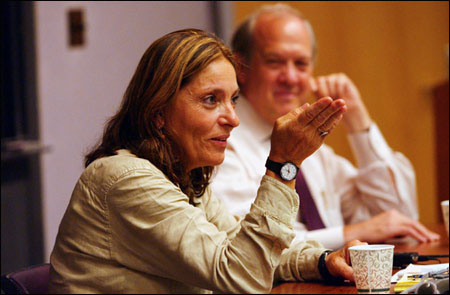From the KSG, this is Sylvia Poggioli:
NPR’s Poggioli shares insight on troubled U.S.-European relations

Welcoming National Public Radio (NPR) senior European correspondent Sylvia Poggioli to an overflow-capacity brown-bag lunch at the Kennedy School of Government on Oct. 11, Shorenstein Center Director Alex Jones issued two warnings to the audience.
Beware of the “Harvard food police” and clean up after your lunch.
And no, Poggioli won’t issue her notorious NPR sign-off on command, so don’t ask.
What Poggioli did deliver was a concise and compelling analysis of the growing tension between Europe and the United States, presented with the same thoughtful detail that has made her one of NPR’s most respected and popular reporters.
America’s war on terrorism and President George W. Bush’s determination to topple Saddam Hussein, combined with Europe’s geography, lack of continental unity, and ambivalence toward its immigrant population has created “a gulf of disharmony between the United States and Europe,” said Poggioli.
Poggioli, a Providence, R.I., native and 1968 graduate of Harvard College who now lives in Italy, said that immediately following the events of last Sept. 11, Europeans abandoned their traditional disdain toward Americans.
“Something really extraordinary happened,” she said. “There was an incredible outpouring of warmth for every American in sight.”
Shortly, however, the disconnect between the continents returned with renewed vigor.
“The solidarity honeymoon is long over,” she said, then outlined a number of factors that have contributed to what she called a “trans-Atlantic chasm.”
Europeans, whose history is rife with invasions, cannot grasp Americans’ transformed sense of vulnerability since the Sept. 11 attacks, she said. In addition, there are millions of Muslim immigrants in Europe, both feared and needed in the workforce if Europe is to maintain its standard of living.
Geography, too, makes Europe loathe to fight the war on terror with the same absolutism that characterizes the American stance.
“Europe feels itself at swimming distance from the Arab world,” said Poggioli.
European-American relations, while not without conflict, fared better during the Clinton administration, said Poggioli, noting that Europeans refer to George W. Bush as “the toxic Texan.”
“Bush fulfills every European prejudice about anti-intellectual Americans,” she said.
Finally, Europe’s own frustration and anxiety about its military might and its fragmentation on issues like immigration and foreign policy play a role in chilly relations with the United States.
Poggioli expanded upon these remarks and tackled other issues, from media to the Catholic Church, in a generous question-and-answer session.
A 20-year veteran of NPR who has given American listeners front-row seats to the fall of communism in Eastern Europe, the civil war in Yugoslavia and the conflict in Kosovo, Poggioli remarked that covering a war in Iraq might be even more difficult for journalists than reporting on the attacks on Afghanistan.
“This one’s going to be really, really tough,” she said.
Distancing herself from NPR management, she acknowledged that recent criticism – and withdrawal of support – from some groups for a perceived pro-Palestinian bias in reporting on the Middle East has been difficult. Yet, she said, the criticism is not limited to pro-Israeli groups.
“We’ve been attacked on all sides,” she said.
Surprisingly, NPR does not hold the same revered status in Europe that it does in America.
Beyond a very small group of intellectual elites, she told the audience, “I can assure you that in Europe, NPR is totally unknown.” She described calling government offices to request interviews and having to explain who she is.
Digressing from the war on terror but further amplifying the European-American disconnect, Poggioli said that the sex scandals rocking the Catholic Church here are widely viewed, particularly by the Vatican, as an American problem.
“For reasons that I still find totally mysterious, the European media almost completely has ignored this story,” she said, despite similar scandals in Ireland and Poland. “This problem is not an American problem,” she added.
Repeatedly, Poggioli pointed to European disunity, especially on immigration and foreign policy, as a major barrier to changing the course of America’s war on terror and, perhaps, on Iraq.
“This united Europe is ever more elusive,” said Poggioli. “Europe is facing this new American assertiveness in a state of confusion and disarray.”




